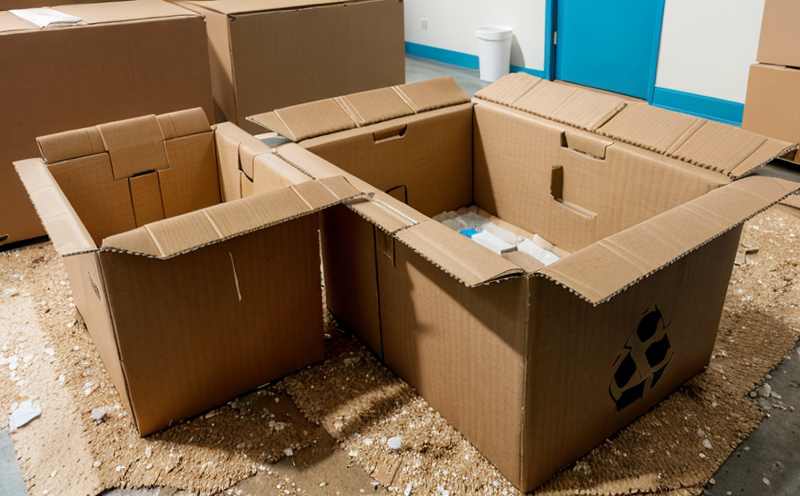ISO 5277 Recycled Paper Stiffness Measurement
The ISO 5277 standard is a pivotal method used to measure the stiffness of recycled paper, which is essential for ensuring that recycled materials meet quality and performance standards. This service focuses on the mechanical properties of recycled paper products, particularly their resistance to bending or flexing under load.
Recycling paper involves breaking down fibers through processes like pulping, washing, and de-inking before reprocessing them into new paper products. The stiffness measurement is critical as it helps determine whether the recycled paper can be used in applications that require specific levels of strength and flexibility, such as packaging materials or printing papers.
Stiffness testing involves subjecting a sample to controlled bending stresses using specialized equipment like the Universal Testing Machine (UTM). The machine applies force perpendicular to the surface of the paper until it bends beyond a specified angle. The resulting stress-strain curve provides valuable insights into how the paper will behave under real-world conditions.
The standard specifies precise procedures for preparing test specimens, including trimming them to standard dimensions and weights, ensuring they are free from defects that could affect results. It also outlines environmental conditions necessary during testing to prevent variations due to humidity or temperature fluctuations.
Accurate measurement of recycled paper stiffness is crucial not only for quality control but also for sustainability initiatives. By understanding the mechanical properties of recycled products early in the development process, manufacturers can optimize their production processes and ensure compliance with industry standards.
Incorporating ISO 5277 testing into your workflow ensures that you stay ahead of regulatory changes while maintaining high-quality outputs. This service supports various sectors including packaging industries where lightweight yet strong materials are needed; printing presses requiring stable substrates for optimal print quality; and manufacturing plants producing corrugated boxes or folding cartons.
Understanding the nuances behind this testing process allows stakeholders to make informed decisions about their raw material choices, ultimately leading to more sustainable practices across industries.
Benefits
- Ensure compliance with international standards for recycled paper stiffness.
- Promote consistent quality among different batches of recycled materials.
- Identify potential issues early in the manufacturing process to prevent costly rejections downstream.
- Support continuous improvement efforts by providing actionable data on material performance.
Customer Impact and Satisfaction
Incorporating ISO 5277 stiffness measurement into your operations has numerous positive impacts on customer satisfaction. Firstly, it enhances trust with customers by demonstrating adherence to rigorous international standards.
Secondly, accurate testing ensures that recycled paper products consistently meet the expected quality levels, reducing complaints and returns. This reliability fosters long-term relationships based on mutual respect and confidence.
Thirdly, providing detailed reports allows clients to understand the mechanical properties of their purchased materials fully. Such transparency builds trust further and encourages repeat business from satisfied customers.
The ability to consistently meet or exceed expectations translates directly into higher customer satisfaction scores. Happy customers are more likely to recommend your services or products to others, thereby expanding your market reach organically through word-of-mouth marketing.
Moreover, by incorporating this service, you demonstrate a commitment to innovation and quality assurance. This proactive approach sets your company apart from competitors who may not prioritize such measures as thoroughly.
In conclusion, implementing ISO 5277 stiffness measurement into your testing regimen provides tangible benefits that contribute significantly to overall customer satisfaction while reinforcing your position in the competitive marketplace.
Environmental and Sustainability Contributions
Testing recycled paper according to ISO 5277 not only enhances product quality but also plays a crucial role in environmental stewardship. By accurately measuring stiffness, manufacturers can optimize their recycling processes, ensuring that the highest-quality materials are used.
This optimization leads to reduced waste generation since less material is discarded during production adjustments. Additionally, using recycled paper efficiently helps conserve natural resources by minimizing deforestation and reducing energy consumption associated with raw material extraction.
The service supports sustainable practices in several ways:
- It encourages the use of higher-quality recycled fibers.
- Promotes efficient recycling methods that extend the life cycle of paper products.
- Reduces environmental impact by minimizing resource consumption and waste production.
By integrating this service into your operations, you contribute positively to global sustainability goals. This proactive stance not only enhances your brand reputation but also aligns with broader societal aspirations for a greener future.





